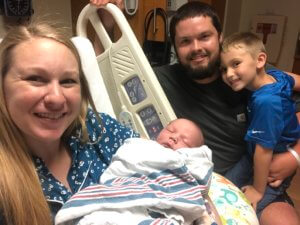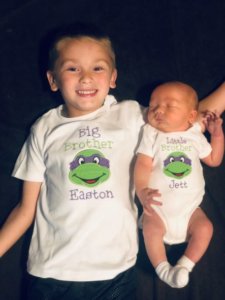Secondary infertility affects many couples trying to get pregnant again

Hannah and Ryan never imagined it would be so hard to get pregnant again. But the struggle of secondary infertility proved having a second baby would not be so easy.
Hannah’s son Easton had been asking for a baby brother or sister for years. Every time they passed a baby, Easton would ask for a sibling. He even thought they could buy a baby brother or sister for him at the Osh Kosh store.
Easton was born in 2016 and Hannah and her husband Ryan had had no problems getting pregnant for him. In fact, she had gotten pregnant the first month they tried. Their little boy was two years old and they were ready to add to their family. Surely this was a wish they could easily make come true.
But it was now September 2020 with no hint of a baby yet, even after a year of no fertility medications and another year that included three rounds of Clomid they did with Hannah’s OB/Gyn. She had lately been experiencing longer than usual cycles and was getting a little worried. Hannah had even taken an herbal supplement for a year, but that seemed to have messed up her cycle even more. Hannah and Ryan, who live in Dry Prong, LA, decided it was time to find more answers.
They made an appointment with Dr. John Storment at Fertility Answers in Lafayette to explore what could be hindering their efforts to get pregnant again. “Our number one question was why is it so difficult this time, yet was so easy with Easton?” says Hannah. “Dr. Storment gave the most heartbreaking, yet heartwarming, answer: ‘Secondary infertility, but I’m going to do everything I can to fix it.’”
They finally had an answer, but overcoming it would be a challenge.
The inability to conceive a second child after a previous baby in not uncommon
Secondary infertility, or the inability to conceive after a previous baby, is not uncommon. Couples and women who have had a previous pregnancy often think of themselves as having “normal” fertility, but this isn’t always the case. Secondary infertility can be frustrating and emotionally taxing.
Patients who find it difficult conceiving a second child have a very different burden to bear. They often don’t think of themselves as “infertile” since they have conceived in the past. Unfortunately for some, having a child once is not a guarantee that you will be eternally fertile.
Why some couples experience difficulty conceiving a second child can be complex and an underlying cause may not be immediately evident. Age may be part of the equation since many women experiencing secondary infertility are in their 30s, a time when egg quality and quantity begin to decline. Structural or medical issues with the woman’s reproductive system that have arisen since the first pregnancy could also hinder pregnancy. Additionally, lifestyle and environmental changes that have taken place since the first pregnancy may cause problems with sperm. All of these can lead to problems getting pregnant a second time.
Intrauterine insemination is often the first-line fertility treatment
After meeting with Dr. Storment, he advised them to do some routine testing that would help rule out possible causes for their inability to get pregnant. Hannah was scheduled for an hysterosalpingogram, HSG, to rule out any problems with blocked fallopian tubes, an anti-Mullerian hormone test to get an idea of her remaining egg supply, and a two-hour glucose tolerance test that would uncover possible insulin resistance and might explain her sometimes erratic cycles. Ryan, too, was tested to make sure his sperm were healthy and plentiful. All of their tests came back normal.
Hannah and Ryan decided to follow his advice by trying intrauterine inseminations, commonly used as a first-line treatment for infertility that is hard to pinpoint. “After the first round failed,” says Hannah, “we remained hopeful that the next round would work.” But the second one failed to produce a pregnancy either. “This hit us hard,” says Hannah. “I knew that mentally I couldn’t survive many more heartbreaks. So, Ryan and I agreed that we would try one more round.”
For the third IUI round, Dr. Storment changed and increased Hannah’s cocktail of fertility medication in anticipation that if her ovaries did not respond well, she could be easily converted to an in vitro fertilization, IVF, cycle. To everyone’s surprise, this cocktail worked a little too well with Hannah producing so many mature eggs that she risked a high order pregnancy. So, before the IUI could be performed, Dr. Storment aspirated most of the mature egg follicles, leaving two before performing the insemination.
Third time’s the charm
After an IUI comes the dreaded two-week-wait, the requisite 14 days of waiting before taking a pregnancy test. “During these 14 days after the third IUI, I prayed for the Lord to show me what our future was,” remembers Hannah. “Each time I felt like I was being told ‘I’ve got this. Let me do this.’”

On day 14, Hannah took a home pregnancy test, hopeful. She saw the faintest of lines, so faint that she thought she was imagining it. She took another test, same result, barely a line. She called Fertility Answers to let them know and they scheduled her to come in two days later. She and Ryan were ecstatic when her pregnancy was confirmed, but they kept the news secret for several more weeks to make sure the baby was healthy and her hormone levels were where they were supposed to be.
But the secret didn’t last long! Easton, so excited to be a big brother, announced it to his whole class before they had told anyone else. “In the future, if I get pregnant again, Easton will be the last to know,” jokes Hannah. But for now, they are all just a happier, bigger family with the arrival of baby brother Jett, born in October 2021.


